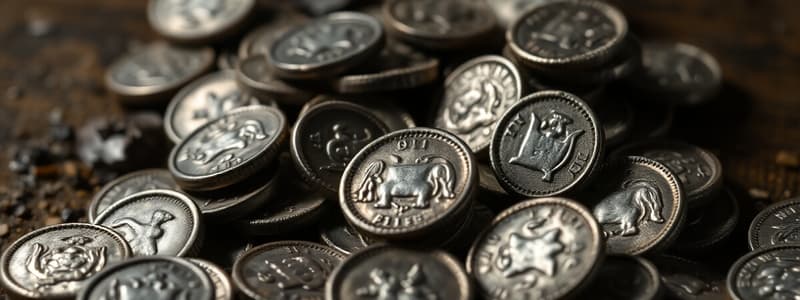Podcast
Questions and Answers
What year did Adam Staples and his friends discover the Chew Valley Hoard?
What year did Adam Staples and his friends discover the Chew Valley Hoard?
- 2018
- 2020
- 2019 (correct)
- 2017
Which king's image appears on roughly half of the coins from the Chew Valley Hoard?
Which king's image appears on roughly half of the coins from the Chew Valley Hoard?
- Edward the Confessor
- William I
- Henry II
- King Harold II (correct)
How many silver pennies were found in the Chew Valley Hoard?
How many silver pennies were found in the Chew Valley Hoard?
- 3,584
- 4,584
- 1,584
- 2,584 (correct)
What was the estimated worth of the Chew Valley Hoard in terms of sheep?
What was the estimated worth of the Chew Valley Hoard in terms of sheep?
How much did the South West Heritage Trust pay for the Chew Valley Hoard?
How much did the South West Heritage Trust pay for the Chew Valley Hoard?
What were the coins believed to be buried for?
What were the coins believed to be buried for?
What significant historical event coincided with the minting of the coins in the Chew Valley Hoard?
What significant historical event coincided with the minting of the coins in the Chew Valley Hoard?
What will happen to the Chew Valley Hoard after it tours museums across the UK?
What will happen to the Chew Valley Hoard after it tours museums across the UK?
Flashcards
Chew Valley Hoard
Chew Valley Hoard
A collection of 2,584 silver pennies from the 11th century, discovered in Chew Valley, England.
King Harold II
King Harold II
The last Anglo-Saxon king of England, defeated and killed by William I at the Battle of Hastings in 1066.
William I (The Conqueror)
William I (The Conqueror)
The first Norman King of England who conquered England in 1066.
Coin Cutting
Coin Cutting
Signup and view all the flashcards
Norman Conquest
Norman Conquest
Signup and view all the flashcards
Reason for Burying the Coins
Reason for Burying the Coins
Signup and view all the flashcards
Value of the Chew Valley Hoard
Value of the Chew Valley Hoard
Signup and view all the flashcards
South West Museum of Somerset
South West Museum of Somerset
Signup and view all the flashcards
Study Notes
The Chew Valley Hoard
- A significant treasure of 2,584 silver pennies was unearthed in a Somerset field in 2019.
- The hoard dates from 1066 to 1068, minted at 46 different sites in England.
- The coins represent the period following the Norman Conquest, the defeat of King Harold II by William I.
- Approximately half of the coins depict King Harold II, the other half King William I.
- The coins were likely buried for safekeeping due to rebellions against William I and attacks along the River Avon.
- Some coins are cut in half, a common practice for creating smaller units of currency.
- The hoard was bought for £5.5 million in 2024 by the South West Heritage Trust.
- Staples and his friends will share half of the sale price.
- The remaining half will go to the landowner.
- The hoard's value is estimated at the equivalent of 500 sheep or the income of a large estate.
- The Chew Valley Hoard will tour museums in the UK and be permanently housed in the South West Museum of Somerset.
- The tour commenced in November 2024, starting from the British Museum.
Historical Context
- The discovery of the hoard showcased a crucial moment in English history – the Norman Conquest.
- The conquest marked a shift in rulership and resulted in the loss of King Harold II.
- William I became king of England and ruled until 1087.
Studying That Suits You
Use AI to generate personalized quizzes and flashcards to suit your learning preferences.





